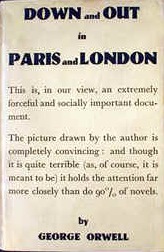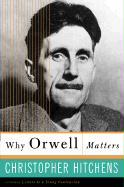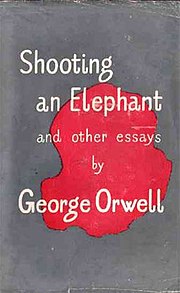
Animal Farm is a beast fable, in the form of a satirical allegorical novella, by George Orwell, first published in England on 17 August 1945. It tells the story of a group of anthropomorphic farm animals who rebel against their human farmer, hoping to create a society where the animals can be equal, free, and happy. Ultimately, the rebellion is betrayed and, under the dictatorship of a pig named Napoleon, the farm ends up in a state as bad as it was before.

Eric Arthur Blair was an English novelist, poet, essayist, journalist, and critic who wrote under the pen name of George Orwell. His work is characterised by lucid prose, social criticism, opposition to totalitarianism, and support of democratic socialism.

Down and Out in Paris and London is the first full-length work by the English author George Orwell, published in 1933. It is a memoir in two parts on the theme of poverty in the two cities. Its target audience was the middle- and upper-class members of society—those who were more likely to be well educated—and it exposes the poverty existing in two prosperous cities: Paris and London. The first part is an account of living in near-extreme poverty and destitution in Paris and the experience of casual labour in restaurant kitchens. The second part is a travelogue of life on the road in and around London from the tramp's perspective, with descriptions of the types of hostel accommodation available and some of the characters to be found living on the margins.

Coming Up for Air is the seventh book and fourth novel by English writer George Orwell, published in June 1939 by Victor Gollancz. It was written between 1938 and 1939 while Orwell spent time recuperating from illness in French Morocco, mainly in Marrakesh. He delivered the completed manuscript to Victor Gollancz upon his return to London in March 1939.

Burmese Days is the first novel by English writer George Orwell, published in 1934. Set in British Burma during the waning days of empire, when Burma was ruled from Delhi as part of British India, the novel serves as "a portrait of the dark side of the British Raj." At the centre of the novel is John Flory, "the lone and lacking individual trapped within a bigger system that is undermining the better side of human nature." The novel describes "both indigenous corruption and imperial bigotry" in a society where, "after all, natives were natives—interesting, no doubt, but finally...an inferior people".

A mahout is an elephant rider, trainer, or keeper. Mahouts were used since antiquity for both civilian and military use. Traditionally, mahouts came from ethnic groups with generations of elephant keeping experience, with a mahout retaining his elephant throughout its working life or service years.
A Hanging (1931) is a short essay written by George Orwell, first published in August 1931 in the John Middleton Murry’s British literary magazine The Adelphi and then reprinted in 1946 in the British literary magazine The New Savoy. Set in Burma, where Orwell had served in the British Imperial Police from 1922 to 1927, it describes the execution of a criminal.

Mawlamyine, formerly Moulmein, is the fourth-largest city in Myanmar (Burma), 300 kilometres (190 mi) south east of Yangon and 70 kilometres (43 mi) south of Thaton, at the mouth of Thanlwin (Salween) River. Mawlamyine was an ancient city and the first capital of British Burma. The city is currently the capital and largest city of Mon State and the main trading centre and seaport in south eastern Myanmar.
Sahib or Saheb is an Arabic title meaning 'companion'. It was historically used for the first caliph Abu Bakr in the Quran.

The British colonial rule in Burma lasted from 1824 to 1948, from the successive three Anglo-Burmese wars through the creation of Burma as a province of British India to the establishment of an independently administered colony, and finally independence. The region under British control was known as British Burma, and officially known as Burma from 1886. Various portions of Burmese territories, including Arakan and Tenasserim, were annexed by the British after their victory in the First Anglo-Burmese War; Lower Burma was annexed in 1852 after the Second Anglo-Burmese War. The annexed territories were designated the minor province of British Burma in 1862.
"Inside the Whale" is an essay in three parts written by George Orwell in 1940. It is primarily a review of Tropic of Cancer by Henry Miller with Orwell discoursing more widely over English literature in the 1920s and 1930s. The biblical story of Jonah and the whale is used as a metaphor for accepting experience without seeking to change it, Jonah inside the whale being comfortably protected from the problems of the outside world. It was published, alongside two other pieces by Orwell, 11 March 1940 by Gollancz in Orwell's first collection of essays, Inside the Whale and Other Essays.

"Mandalay" is a poem by Rudyard Kipling, written and published in 1890, and first collected in Barrack-Room Ballads, and Other Verses in 1892. The poem is set in colonial Burma, then part of British India. The protagonist is a Cockney working-class soldier, back in grey, restrictive London, recalling the time he felt free and had a Burmese girlfriend, now unattainably far away.
"The Lion and the Unicorn: Socialism and the English Genius" is an essay by George Orwell expressing his opinions on the situation in wartime Britain. The title alludes to the heraldic supporters appearing in the full royal coat of arms of the United Kingdom. The essay was first published on 19 February 1941 as the first volume of a series edited by T. R. Fyvel and Orwell, in the Searchlight Books published by Secker & Warburg. Orwell's wife Eileen Blair described the theme of the essay as "how to be a socialist while Tory."

Why Orwell Matters, released in the UK as Orwell's Victory, is a book-length biographical essay by Christopher Hitchens. In it, the author relates George Orwell's thoughts on and actions in relation to: The British Empire, the Left, the Right, the United States of America, English conventions, feminism, and his controversial list for the British Foreign Office.

The bibliography of George Orwell includes journalism, essays, novels, and non-fiction books written by the British writer Eric Blair (1903–1950), either under his own name or, more usually, under his pen name George Orwell. Orwell was a prolific writer on topics related to contemporary English society and literary criticism, who has been declared "perhaps the 20th century's best chronicler of English culture." His non-fiction cultural and political criticism constitutes the majority of his work, but Orwell also wrote in several genres of fictional literature.

Walter Dalrymple Maitland Bell, known as Karamojo Bell after the Karamoja sub-region in Uganda, which he travelled extensively, was a Scottish adventurer, big game hunter in East Africa, soldier, decorated fighter pilot, sailor, writer, and painter.
The Indian Imperial Police, referred to variously as the Indian Police or, by 1905, the Imperial Police, was part of the Indian Police Services, the uniform system of police administration in British India, as established by Government of India Act 1858 and Police Act of 1861. It was motivated by the danger experienced by the British during the 1857 rebellion.
"The Sporting Spirit" is an essay by George Orwell published in the magazine Tribune on 14 December 1945, and later in Shooting an Elephant and Other Essays, a collection of Orwell's essays published in 1950. The essay was written on the heels of the 1945 tour of Great Britain by the Soviet football team FC Dynamo Moscow. The essay became famous for Orwell's description of international sporting competitions as "war minus the shooting", a phrase that has since been used as a metaphor for sports when referred to in popular media and for actions evoking hyper-nationalism and national pride.

"Reflections on Gandhi" is an essay by George Orwell, first published in 1949, which responds to Mahatma Gandhi's autobiography The Story of My Experiments with Truth. The essay, which appeared in the American magazine Partisan Review, discusses the autobiography and offers both praise and criticism to Gandhi, focusing in particular on the effectiveness of Gandhian nonviolence and the tension between Gandhi's spiritual worldview and his political activities. One of a number of essays written by Orwell and published between Animal Farm (1945) and Nineteen Eighty-Four (1949), "Reflections on Gandhi" was the last of Orwell's essays to be published in his lifetime and was not republished until after his death.















